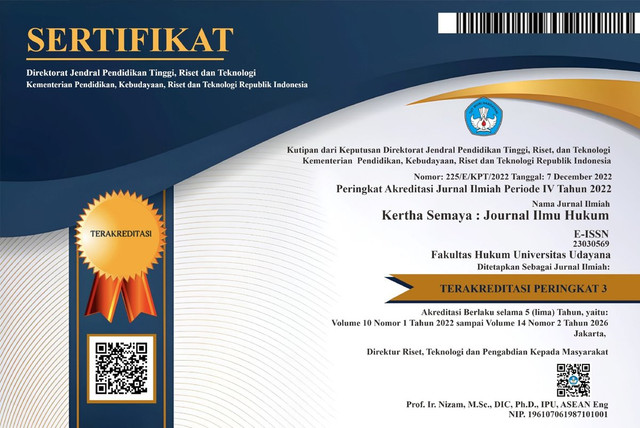INTERPRETASI HUKUM DALAM PENERAPAN METODE SOCRATES UNTUK REFORMASI PERADILAN DI INDONESIA
DOI:
https://doi.org/10.24843/KS.2024.v13.i09.p08Keywords:
Reformasi hukum, Socratic Method, keadilan substantif, positivisme hukum, peradilan IndonesiaAbstract
Reformasi hukum di Indonesia pasca-1998 menuntut perubahan mendasar dalam praktik peradilan yang selama ini cenderung terjebak pada formalisme hukum dan positivisme yang kaku. Salah satu pendekatan filosofis yang relevan untuk mendukung reformasi hukum adalah Socratic Method. Tulisan ini bertujuan mengkaji relevansi Socratic Method sebagai instrumen reformasi hukum dan implikasinya terhadap praktik peradilan Indonesia. Metode ini menekankan dialog kritis melalui tanya jawab yang mendalam guna menguji konsistensi argumen dan menggali prinsip keadilan substantif. Dengan demikian, Socratic Method dapat menjadi instrumen yang memperkuat pencarian kebenaran hukum serta menggeser orientasi peradilan dari sekadar “corong undang-undang” menuju penegakan hukum yang lebih berkeadilan. Hasil kajian menunjukkan bahwa penerapan metode ini berpotensi meningkatkan kualitas argumentasi hukum, memperkuat transparansi persidangan, dan mendorong hakim untuk lebih aktif menggali nilai keadilan substantif. Namun, tantangan utama terletak pada kultur hukum Indonesia yang masih dominan positivistik dan resistensi terhadap perubahan paradigma.
The legal reform in Indonesia after 1998 demands a fundamental shift in judicial practice, which has long been constrained by legal formalism and rigid positivism. One relevant philosophical approach to support such reform is the Socratic Method. This paper aims to examine the relevance of the Socratic Method as an instrument of legal reform and its implications for judicial practice in Indonesia. This method emphasizes critical dialogue through in-depth questioning to test the consistency of arguments and uncover substantive principles of justice. Thus, the Socratic Method may serve as an instrument to strengthen the pursuit of legal truth and to shift the judiciary’s orientation from being a mere “mouthpiece of the law” toward achieving more substantive justice. The findings suggest that its implementation has the potential to improve the quality of legal reasoning, enhance courtroom transparency, and encourage judges to actively seek substantive justice. Nevertheless, the main challenges lie in Indonesia’s legal culture, which remains predominantly positivistic, and the resistance of judicial actors toward paradigm change.
Downloads
Published
How to Cite
Issue
Section
License
Copyright (c) 2025 David Edyson, Wincent Hungstan Angkasa, Dikjaya

This work is licensed under a Creative Commons Attribution-NonCommercial-ShareAlike 4.0 International License.



